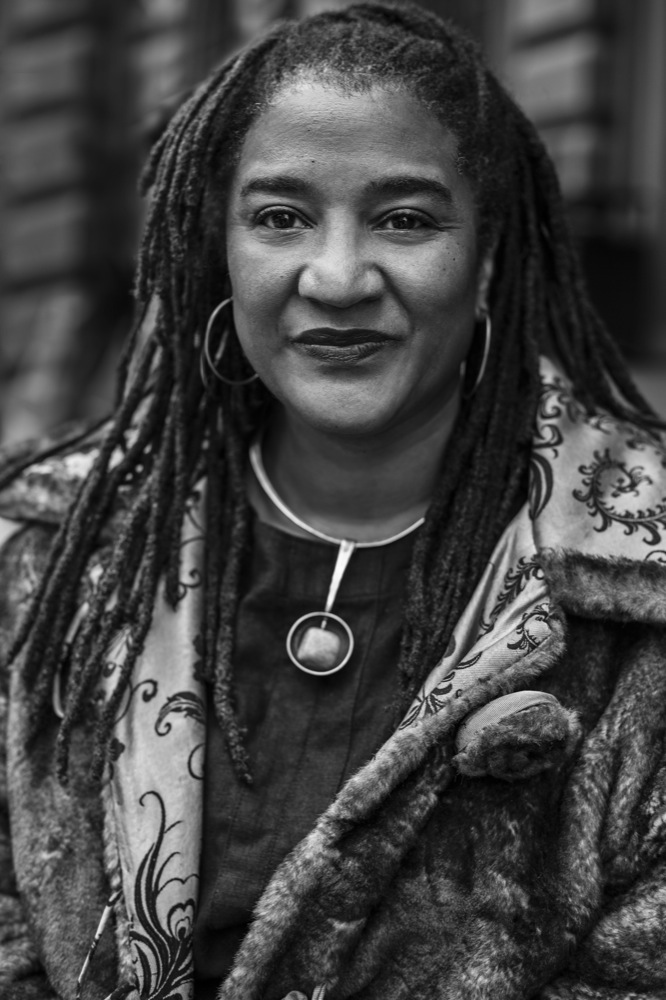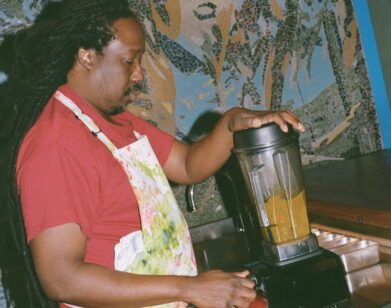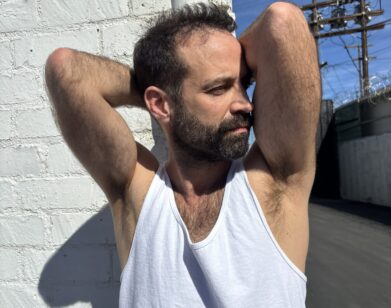Lynn Nottage’s Sweat and Blood

LYNN NOTTAGE AT THE PUBLIC THEATER IN NEW YORK, DECEMBER 2016. PHOTO: VICTORIA STEVENS.
“My motto when I was writing this was ‘replace judgment with curiosity,'” explains Pulitzer-winner Lynn Nottage of her latest play, Sweat, which is currently in its last week of performances at the Public Theater in New York City. “I wanted it very much to be an ensemble piece and to be a collective narrative,” she continues. “The way that the play is structured is that each of the characters has their own aria … There are certainly characters that I judged a little heavier and harsher, but I tried to have empathy for all of them.”
Set in Reading, Pennsylvania, Sweat follows a group of steelworkers as they come to terms with the dissolution of their dreams. The America promised to them—whether it was the America of their forefathers, or a better America than that afforded to their forefathers—no longer exists, and the play tracks their stages of grief: from denial to rage to, perhaps, acceptance or failure. It is tense, visceral, and, despite being set between 2000 and 2008, feels unsettlingly relevant.
EMMA BROWN: What made you want to tell the story of the characters in Sweat?
LYNN NOTTAGE: It began on a very personal level: wanting to understand what was happening to friends of mine around 2011, who suddenly found themselves struggling to make ends meet, and me not understanding how they could go so quickly from a situation where they were doing quite well to being in dire straits. I set about to find the answer to that question, and decided that I would go and investigate in my own way a city that I felt was representative of what was happening in the United States on a larger scale. I found a city called Reading, Pennsylvania, which was in the 2011 census as the poorest city in America for its size. I spent two and a half years going to Reading as often as I could, trying to listen to folks and understand what their situations were. Eventually I stumbled upon a group of steel workers who had been locked out of their plant for 93 weeks. I found that their story was incredibly compelling and representative of a lot of what I was hearing from other people in that they had been solidly middle class—they had completely and totally invested in the American dream—and then had found that the rug was really pulled out from under them. That’s what really led me to telling the story of Sweat.
BROWN: So you didn’t specifically begin with this idea of American deindustrialization?
NOTTAGE: I did. I had received a grant from Oregon Shakespeare, which was specifically to look at American revolutions, and I was very interested in the de-industrial revolution. So I went to Reading with that very much in mind, not yet understanding what story I was going to wind up telling.
BROWN: When you met these people from Reading, were they quite keen to talk to you?
NOTTAGE: I found that everyone that I encountered, regardless of whether it was a homeless person or the mayor or the police chief or steel workers, everyone immediately wanted to tell their story. They felt marginalized by the mainstream media that, by and large at the time, had been ignoring the stories of these mid-sized, post-industrial cities. They felt like they wanted to go on record.
BROWN: When people were telling you their stories, did you get a sense that they thought about who you were—that you were a playwright coming from New York?
NOTTAGE: I was incredibly transparent when I began speaking with people; I let them know that I’m a storyteller. In many instances, I ended up speaking with people over the course of two years and getting to know them—it was a relationship that was built over the course of time. That’s what made it slightly different. Over time they came to trust me and they understood that I had a real investment in telling their story, as opposed to some journalists who when they learned that the city was the poorest city in America came in for an hour, did some quick interviews, left, and then wrote articles based on those encounters.
BROWN: Do you find it easier to write about people once you have a relationship? Or do you start thinking about, “Will they like this? Will they think it’s fair?”
NOTTAGE: I really think it’s more difficult. It’s much easier to conjure characters strictly from your imagination than to have to think about whether you’re representing people in a truthful way. These characters are purely fiction—they’re inspired by people I met—which I think gave me a certain amount of leeway that I wouldn’t have had otherwise were it a verbatim piece.
BROWN: When did you know that you had done enough research—talked to enough people—to start writing the play?
NOTTAGE: I see procrastination and research as part of my artistic process. [laughs] It took me two years of procrastination and research to finally find the story that I wanted to tell. It’s when I land on that moment in which I think, “Ah, yes, this is it, this is my departure point”—then I can push away the research and never revisit it. For me, it’s when I have that impulse to push away that it’s time to begin writing.
BROWN: As an audience member, on the one hand, you want to understand everyone’s perspective and be compassionate, but there was definitely a part of me that felt, “At the end of the day, you’re just wrong.”
NOTTAGE: Well, they are. Some of the characters do have questionable morality, which I find interesting. And in examining the play, everyone on that stage in some way is culpable and takes some responsibility for the outcome. Some more than others, certainly, but I think that that’s what I was interested in.
BROWN: One of the lines in the play that really grabbed me was about how it’s not the guilt or the rage that gets you, but the shame. Is that something that came out during your interviews with people?
NOTTAGE: I found that line in the process of writing. It’s something that came up when I was speaking to a dramaturge, Alison Carey. Originally I was like, “It’s guilt.” And she was like, “I don’t know, it seems as though a lot of these characters carry shame. It’s the shame that they’re not working and the stigma that that carries.” I felt shame was a much better explanation and a heavier emotion than guilt and rage. It’s something that really does eat us away, and we can’t talk about it. Whereas I feel that we express rage; we say, “Oh, I feel guilty,” or, “I feel angry,” but very rarely do we say, “I feel ashamed.”
BROWN: You mentioned that you started researching the play in 2011, and wrote it around 2013, 2014, but it feels as though you could have written it a week ago.
NOTTAGE: It’s kind of spooky in that way, but I have to say that America unfortunately is on sort of a cycle, and we’re back where we were in 2000 with that election.
BROWN: Your plays have all been very different. Is there anyone where you feel like, “Oh, I could never write about those people”? Do you actively set out to tell different stories each time?
NOTTAGE: I don’t write in opposition, so I never think, “Oh, I can’t write about that.” I know that there are some writers that do write that way, I think I just follow my imagination and things that really excite me and intrigue me. When you begin a play, you’re going to have to spend a lot of time with those characters, so those characters are going to have to be rich enough that you want to take a very long journey with them. That’s how I begin thinking about what I want to write about and who I want to write about.
BROWN: Do you ever start plays and leave them unfinished?
NOTTAGE: Quite a few. [laughs] For a multitude of reasons: some plays because they’re written at very emotional moments in my life and I realize that they’re just outlets for what I’m going through—sort of reservoirs of my trauma—and won’t be interesting to anyone but me. And then there are other plays where I just lose interest in the characters, I lose interest in what I’m thematically writing about, and I abandon them.
BROWN: This originally premiered at Oregon Shakespeare. Were you always planning on continuing with it?
NOTTAGE: Oh yeah. It was a co-production with Arena Stage, and I think that we were very specific and strategic about where we wanted to go. I knew that it was an election year coming up; I knew that this was going to be an important conversation. I felt like, by and large, a lot of the media and a lot of politicians were ignoring the way in which economic stagnation was really uprooting communities. So we decided that the next stop would be Washington, back to Oregon, and then it would come to New York just before the election. So I really, really pushed that the play be open just before the election and be running during it.
BROWN: Once a play is cast, how often do you go to rehearsals?
NOTTAGE: When the play is still evolving I try to be at rehearsal as often as possible, and part of that casting process. So doing this I was there just about every day. You find new things when the language is living in different people’s mouths. They’re definitely things that I discovered at every stage. In Arena there were some adjustments I made, and then when we came to New York and had almost a completely new cast there were definitely different things that I found and directions that I wanted to take characters. One of the things I was really interested in was just making really clear the parallels between both mothers and sons.
BROWN: Do you feel like the characters change depending on the actor playing them?
NOTTAGE: People probably have different philosophies about this, but I think that when you’re first shaping the play and trying to find a character, the initial actors that develop it end up imprinting on it—you hear their voices, you hear their rhythms. You can’t help but to begin to write toward them during the rehearsal process.
BROWN: How often do you go see the play once rehearsals have concluded and it’s open to the public?
NOTTAGE: The process in theater is that before you open, you have the preview period, which is—depending on the theater— anywhere from two to four weeks. I try to be in the theater as often as possible during previews because we’re still making a lot of adjustments—sometimes in script, to the writing, to the actual blocking of the play. Then once it’s open, I have a ceremony in which I literally hand the play over to the actors and I say, “I’m giving you the play now, but when this ends, I’m going come back and take it.” [laughs] I think it is really lovely because it’s a letting go process, and it really is theirs; they’re the story.
BROWN: How important is an audience’s reaction to you?
NOTTAGE: During the preview process, it’s incredibly important to me. I see the audience as the final collaborator. I think it’s kind of bullshit when people say, “I’m not interested in the audience reaction.” I’m like, “Then why do you do theater? You can write a book, then you don’t have to see how the audience reacts.” It’s a living, breathing thing. I’m interested in the moments where the audience is restless. I’m interested in the moments where they lean in and become incredibly engaged: the laughter, the silence. All of that is part of how I think about shaping and rewriting the play.
BROWN: What do you want the audience to take away from Sweat ideally?
NOTTAGE: I want the audience, when they leave, to think of the characters on the stage in three dimensions. I want them to have empathy. I also want them to think about engaging more with where we are culturally.
SWEAT IS NOW ON AT THE PUBLIC THEATER IN NEW YORK CITY THROUGH SUNDAY, DECEMBER 18, 2016, AND COMING TO BROADWAY THIS MARCH, 2017.






